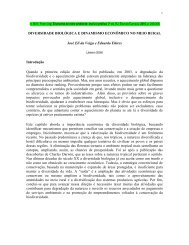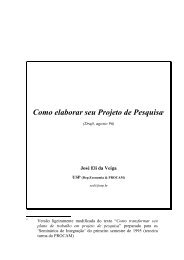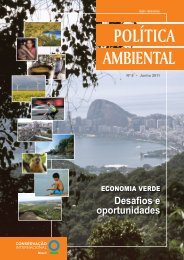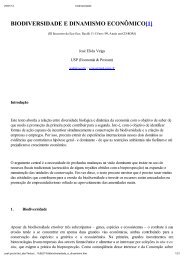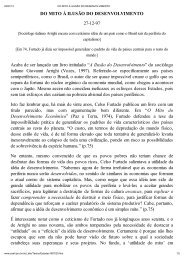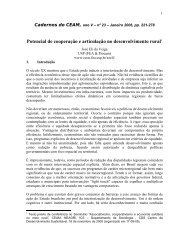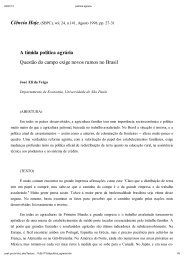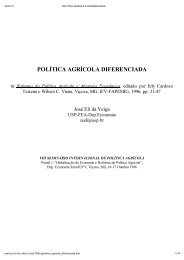sustainable development 20 years on from the ... - José Eli da Veiga
sustainable development 20 years on from the ... - José Eli da Veiga
sustainable development 20 years on from the ... - José Eli da Veiga
You also want an ePaper? Increase the reach of your titles
YUMPU automatically turns print PDFs into web optimized ePapers that Google loves.
141<br />
under <strong>the</strong> Stockholm C<strong>on</strong>venti<strong>on</strong> to help countries to meet <strong>the</strong>ir m<strong>on</strong>itoring commitments, financed by <strong>the</strong><br />
Quickstart Programme (QSP) of <strong>the</strong> Strategic Approach to Internati<strong>on</strong>al Chemicals Management<br />
(SAICM) and by <strong>the</strong> Global Envir<strong>on</strong>ment Facility (GEF). In this c<strong>on</strong>necti<strong>on</strong>, Chile and Peru are<br />
c<strong>on</strong>ducting a project to implement best practices in <strong>the</strong> management of PCBs in <strong>the</strong> mining sector. So far,<br />
12 of <strong>the</strong> regi<strong>on</strong>’s countries have submitted reports <strong>on</strong> implementati<strong>on</strong> and <strong>on</strong> <strong>the</strong> producti<strong>on</strong>, import and<br />
export of <strong>the</strong> POPs listed in <strong>the</strong> annexes to <strong>the</strong> C<strong>on</strong>venti<strong>on</strong>. 18<br />
(d)<br />
Strategic Approach to Internati<strong>on</strong>al Chemicals Management<br />
The Strategic Approach to Internati<strong>on</strong>al Chemicals Management (SAICM), a policy framework<br />
for promoting chemical safety worldwide by <str<strong>on</strong>g>20</str<strong>on</strong>g><str<strong>on</strong>g>20</str<strong>on</strong>g>, was adopted as part of <strong>the</strong> Plan of Implementati<strong>on</strong> for<br />
<strong>the</strong> World Summit <strong>on</strong> Sustainable Development. The forum is unique in that it includes representatives of<br />
all stakeholders involved in chemicals, <strong>on</strong> an equal footing and in a participatory framework. A number of<br />
countries have begun to develop nati<strong>on</strong>al implementati<strong>on</strong> plans for SAICM and have received support<br />
<strong>from</strong> <strong>the</strong> Quickstart Programme to fund projects for fostering activities and building capacity in chemicals<br />
management. Parties to Rounds I and II of <strong>the</strong> Quickstart Programme include: Barbados, Chile, Costa<br />
Rica, Ecuador, Guatemala, H<strong>on</strong>duras, Nicaragua, Plurinati<strong>on</strong>al State of Bolivia and Trini<strong>da</strong>d and Tobago.<br />
At <strong>the</strong> recent Third Latin American and Caribbean Regi<strong>on</strong>al Meeting <strong>on</strong> <strong>the</strong> Strategic Approach to<br />
Internati<strong>on</strong>al Chemicals Management (Panama City, 2-3 June <str<strong>on</strong>g>20</str<strong>on</strong>g>11), five resoluti<strong>on</strong>s were adopted <strong>on</strong><br />
nanotechnology and manufactured nanomaterials; hazardous substances within <strong>the</strong> life cycle of electrical<br />
and electr<strong>on</strong>ic equipment; <strong>the</strong> health sector strategy; lead in paint; and financing SAICM implementati<strong>on</strong>.<br />
(e)<br />
Pollutant release and transfer registers<br />
Pollutant release and transfer registers (PRTRs) are key instruments in ensuring that civil society<br />
has access to informati<strong>on</strong> <strong>on</strong> <strong>the</strong> management of chemicals and <strong>the</strong>ir sources of emissi<strong>on</strong>. Since <strong>the</strong> early<br />
1990s, a number of nati<strong>on</strong>al and regi<strong>on</strong>al organizati<strong>on</strong>s have developed systems for collecting and<br />
disseminating <strong>da</strong>ta <strong>on</strong> emissi<strong>on</strong>s and transfers of toxic chemicals <strong>from</strong> industrial facilities.<br />
Since Mexico’s pi<strong>on</strong>eering experience in establishing a PRTR under <strong>the</strong> North American Free<br />
Trade Agreement (NAFTA), several countries in <strong>the</strong> regi<strong>on</strong> have developed such systems, influenced also<br />
by free-trade agreements such as <strong>the</strong> agreement between Chile and Cana<strong>da</strong>. As part of <strong>the</strong> Dominican<br />
Republic-Central America-United States Free Trade Agreement (CAFTA-DR), a number of Central<br />
American countries, toge<strong>the</strong>r with <strong>the</strong> Dominican Republic, currently benefit <strong>from</strong> a cooperati<strong>on</strong><br />
programme with <strong>the</strong> United States for <strong>the</strong> <str<strong>on</strong>g>development</str<strong>on</strong>g> of PRTRs. However, in most countries <strong>the</strong>re are<br />
still no comprehensive systems for informati<strong>on</strong> access and sharing that are rigorously and systematically<br />
up<strong>da</strong>ted (Salinas, <str<strong>on</strong>g>20</str<strong>on</strong>g>07).<br />
(f)<br />
Globally Harm<strong>on</strong>ized System of Classificati<strong>on</strong> and Labelling of Chemicals<br />
The Globally Harm<strong>on</strong>ized System of Classificati<strong>on</strong> and Labelling of Chemicals (GHS), which<br />
was originally established in <str<strong>on</strong>g>20</str<strong>on</strong>g>03 and whose latest editi<strong>on</strong> <strong>da</strong>tes <strong>from</strong> <str<strong>on</strong>g>20</str<strong>on</strong>g>09, facilitates communicati<strong>on</strong><br />
and acti<strong>on</strong> in <strong>the</strong> event of accidents and allows measures to be taken to protect health and <strong>the</strong> envir<strong>on</strong>ment<br />
during chemicals handling, transport and use. GHS implementati<strong>on</strong> calls for initiatives in a variety of<br />
sectors, in particular transport, industry and agrochemicals, as well as for <strong>the</strong> incorporati<strong>on</strong> of civil society<br />
participati<strong>on</strong> and labour issues.<br />
18<br />
See [<strong>on</strong>line] http://chm.pops.int/Countries/Nati<strong>on</strong>alReporting/tabid/254/language/en-US/Default.aspx.



